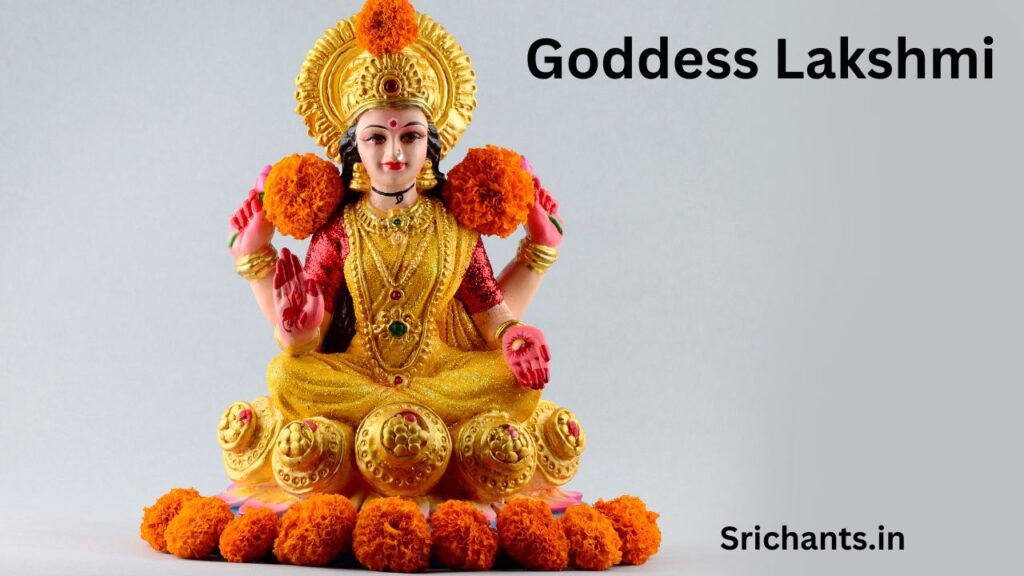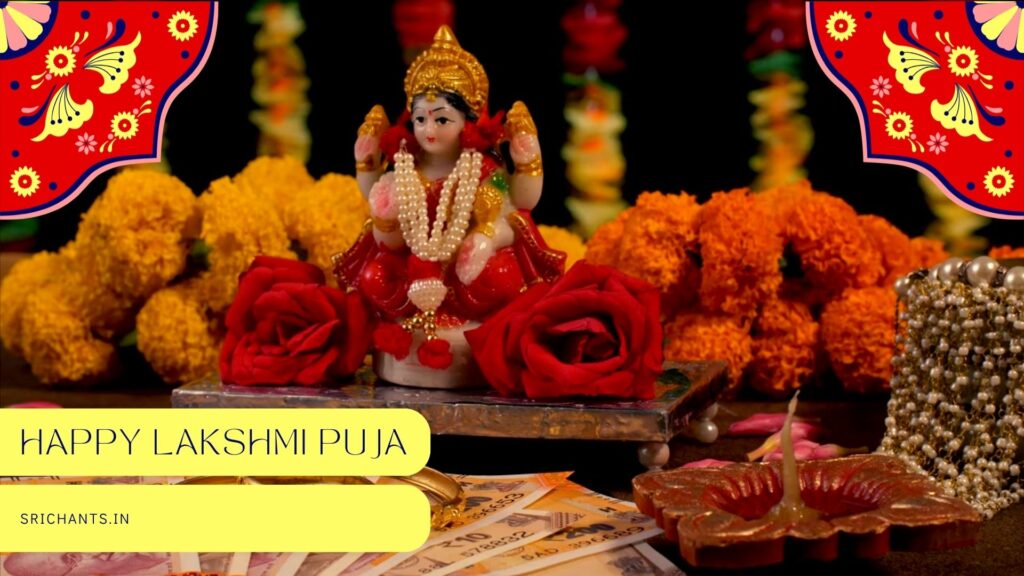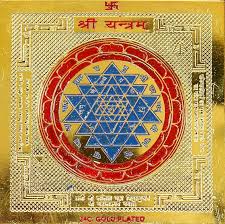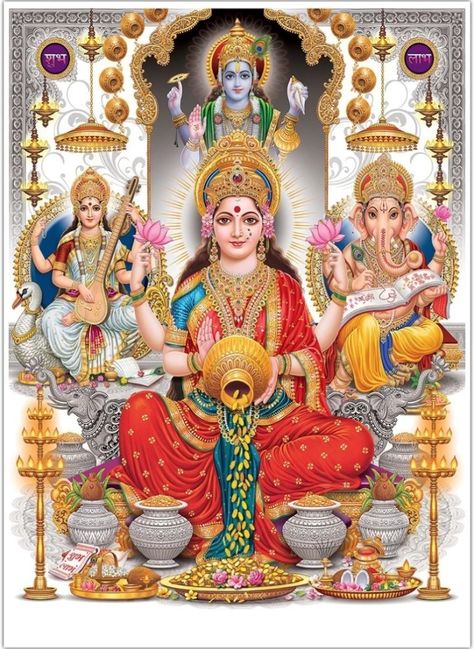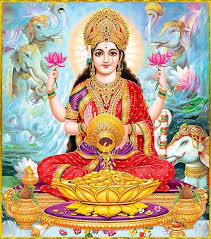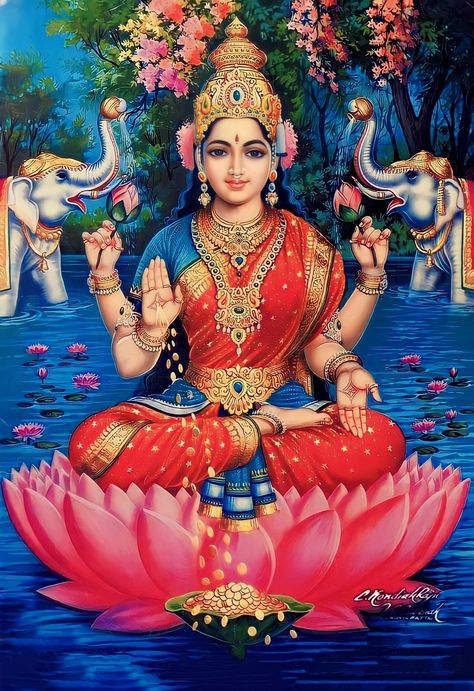Significance Of Lakshmi : Goddess Lakshmi in Hindu Festivals
Introduction
For centuries, Lakshmi, the Hindu goddess of prosperity, abundance, and fortune, has been a central figure in the rich tapestry of Indian culture. Lakshmi’s divine presence is commemorated throughout the Hindu calendar during a variety of auspicious festivals, as she is the consort of Lord Vishnu, the Preserver in the Hindu triumvirate. The benevolent Goddess Lakshmi is invoked to impart her blessings of spiritual enlightenment, success, and abundance upon her devotees, from the vibrant Diwali celebrations to the sacred Navaratri rituals.
The Mythical Origins of Lakshmi
One of the most celebrated narratives in Hindu mythology is the captivating story of Lakshmi’s emergence from the Churning of the Cosmic Ocean. The divine Lakshmi emerged from the churning waves, situated on a magnificent lotus flower, as the gods and demons engaged in a titanic struggle to obtain the elixir of immortality. The celestial deities instantly recognized her resplendent beauty and auspicious presence as a sign of prosperity and good fortune, and they embraced her as their cherished consort.
Lakshmi’s intrinsic connection to the lotus, a symbol of purity, beauty, and spiritual transcendence in Hinduism, is emphasized in this mythical account. The lotus, with its roots firmly planted in the soil and its blossoms reaching the sky, is interpreted as a metaphor for the human experience: the capacity to transcend the material world through devotion and divine grace. Lakshmi’s role as a guiding light is further emphasized by her strong connection to this sacred flower, which illuminates the path to enlightenment and material abundance.

The Symbolic Significance and Iconography of Lakshmi
Lakshmi’s iconic representation is visually captivating and replete with symbolic significance. She is typically depicted as a beautiful woman with four limbs, either seated or standing on a lotus flower. Kama (desire), artha (prosperity), dharma (righteous living), and moksha (spiritual liberation) are the four primary objectives of human existence in Hinduism. Her four hands frequently hold objects that epitomize these objectives.
Another unique aspect of Lakshmi’s iconography is the presence of elephants, which either flank her or spill sacred water over her. The qualities of strength, power, and wisdom that Lakshmi is believed to bestow upon her devotees are symbolized by these majestic creatures. Furthermore, the coins or gold that emanate from Lakshmi’s hands symbolize her status as the goddess of fortune and material prosperity.
Lakshmi is revealed as a multifaceted and multidimensional deity through her symbolic representation, which encompasses the pursuit of spiritual fulfillment in addition to material well-being. Lakshmi’s divine influence is characterized by this comprehensive perspective on human existence, which directs her followers toward a harmonious equilibrium between the divine and the material.
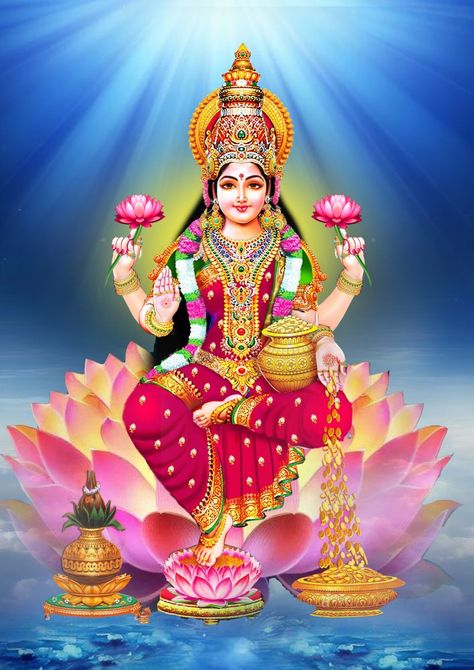
Lakshmi’s Significance in Hindu Festivals
Goddess Lakshmi is most conspicuously honored during the festival of Diwali, which is also referred to as the “Festival of Lights.” The festivities are centered around Lakshmi’s involvement in the epic tale, which commemorates the return of Lord Rama to his dominion after defeating the demon Ravana.
The people of the kingdom lit lamps to guide Rama, Sita, and Lakshmana home upon their return to Ayodhya, as the narrative goes. Hindus worldwide light diyas (earthen lamps) and candles during Diwali to invoke the benevolent Lakshmi’s presence and bestow her blessings of prosperity and well-being within their residences.
The significance of Lakshmi is further underscored by the rituals associated with Diwali. Hindus conduct a comprehensive cleaning of their residences and enterprises in advance of the primary festival to establish a welcoming atmosphere for the Goddess. On the day of Lakshmi Puja, devotees exchange gifts and initiate new enterprises in order to seek the Goddess’s favor, perform aarti (a ritual of waving lighted lamps), and offer prayers.
Nevertheless, Lakshmi’s veneration is not restricted to Diwali. Additionally, she is commemorated during the Navaratri festival, with the fourth, fifth, and sixth evenings being specifically designated for her. In addition, Hindus purchase new gold, silver, and other valuables during the festival of Dhanteras, which is observed two days prior to Diwali. They believe that Lakshmi will honor these acquisitions.
Lakshmi’s Representation in the Home
In addition to the elaborate celebrations of Hindu festivals, Lakshmi’s influence is also profoundly ingrained in the daily lives of Hindu households. The deity is reputed to inhabit locations that are characterized by virtue, bravery, and hard work, and her favor is sought through consistent worship and offerings.
Many families participate in puja (worship) rituals and prepare special dishes in her honor on Fridays, which are considered particularly auspicious for Lakshmi’s veneration. The mother of the household is frequently depicted as an embodiment of Lakshmi, who is accountable for the family’s prosperity and well-being. In order to evoke Lakshmi’s blessings, rituals such as the lighting of lamps and the display of auspicious symbols such as the swastika are performed.
Lakshmi’s influence transcends the domain of material wealth by means of these intimate, everyday practices, which penetrate the very essence of Hindu domestic life. Her presence is considered indispensable for the household’s spiritual development, familial unity, and harmony.
Lakshmi’s Diverse Favors
Lakshmi’s divine bounties are not restricted to material prosperity. Although she is regarded as the goddess of prosperity, she is also reputed to bestow a variety of other auspicious gifts upon her devotees.
Lakshmi is linked to purity, fecundity, and good fortune, in addition to material abundance. The success of any new endeavor, whether it be the commencement of a business, the acquisition of a new residence, or the commencement of a new academic year, is contingent upon her presence. Hindus frequently seek Lakshmi’s blessings to initiate significant life events, as they believe that they will guarantee their prosperity and well-being.
Furthermore, the spiritual significance of Lakshmi should not be disregarded. It is believed that she embodies the divine feminine principle, representing the ideal balance between the material and spiritual realms, as the consort of Lord Vishnu. Her worship is regarded as a method of achieving not only material fulfillment but also interior peace, wisdom, and, ultimately, moksha (liberation from the cycle of birth and death).
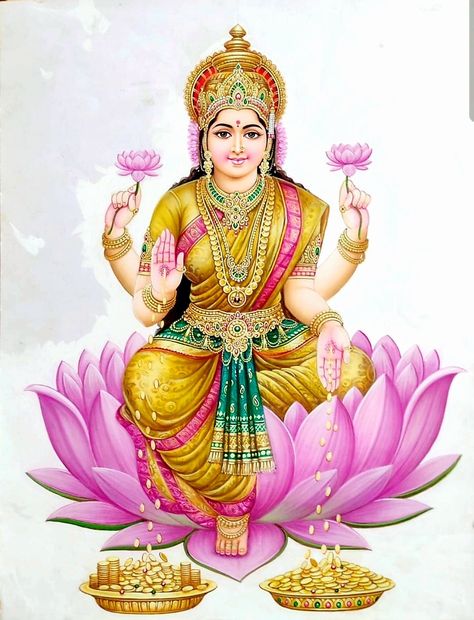
The Principles of Lakshmi Worship
The fundamental tenets of Hindu philosophy, which underscore the significance of maintaining a balance between the pursuance of material prosperity and the cultivation of spiritual enlightenment, are the foundation of the reverence for Goddess Lakshmi.
The principle of “Vishishtadvaita,” or qualified non-dualism, as espoused by the esteemed Hindu theologian Ramanuja, is the foundation of Lakshmi worship. This philosophy posits that the divine and the corporeal world are not distinct entities, but rather interconnected and interdependent. Lakshmi, the embodiment of this principle, is regarded as the divine energy that animates and sustains the material domain, as well as a conduit to the spiritual realm.
Lakshmi devotees are advised to maintain a balanced perspective when approaching her worship, refraining from either completely abandoning the material world or falling prey to the traps of materialism and avarice. Rather, they are encouraged to approach their worldly obligations and responsibilities with a sense of dispassion, and to regard their material possessions and accomplishments as blessings conferred by the Goddess, to be employed in the service of the divine and the greater good.
Lakshmi’s Presence in the Spiritual Realm
Although Lakshmi’s influence is profoundly rooted in the material world, her spiritual significance is equally profound. It is believed that she embodies the divine feminine principle, representing the ideal balance between the material and spiritual realms, as the consort of Lord Vishnu.
Lakshmi is frequently depicted in Hindu mythology as supporting Vishnu in his numerous incarnations, providing guidance, inspiration, and strength. For instance, in the epic Ramayana, Sita, the wife of Lord Rama, is regarded as an avatar of Lakshmi, symbolizing her virtues of purity, devotion, and compassion.
Lakshmi’s spiritual influence is not limited to her status as Vishnu’s consort. Devotees desire her blessings for intellectual pursuits and the attainment of spiritual enlightenment, as she is also revered as a goddess of knowledge and wisdom. The Lakshmi Tantra and the Lakshmi Sahasranama, sacred texts and commentaries associated with Lakshmi, provide a profound exploration of the philosophical and esoteric aspects of her devotion, thereby revealing the multifaceted nature of her divine essence.

Lakshmi’s Persistent Legacy
The Hindu diaspora’s reverence for Goddess Lakshmi has persisted for centuries, transcending cultural and geographical barriers. Her iconography and symbolism are prominently featured in temples, sculptures, and paintings, leaving an indelible impression on the artistic, literary, and architectural traditions of India.
The Indian subcontinent is dotted with Lakshmi’s temples, each of which serves as a testament to her enduring relevance and a center of devotion, demonstrating the legacy of her worship. The Shri Ranganathaswamy Temple in Srirangam, Tamil Nadu, and the Tirumala Venkateswara Temple in Andhra Pradesh, both of which contain iconic Lakshmi shrines, are merely two of the numerous sacred spaces that are dedicated to the Goddess.
Lakshmi’s influence is interwoven with Hindu scriptures, epics, and devotional poetry in the domain of literature. The Lakshmi Sahasranama, a text that celebrates the Goddess’s thousand names, has become a cherished resource for her devotees, providing a profound examination of her multifaceted nature.
Her enduring legacy serves as a testament to the Hindu tradition’s ability to adapt and thrive in the face of changing times, as Hindus continue to commemorate Lakshmi’s festivals and engage in her worship. Goddess Lakshmi continues to serve as a guiding light, assisting her followers in the harmonious integration of their spiritual and material well-being.
conclusion
The enduring significance of Goddess Lakshmi in the spiritual and cultural fabric of India is evidenced by her profound influence on Hindu festivals and domestic life. Lakshmi’s beneficent influence is interwoven into the very fabric of Hindu life, from the lively festivities of Diwali to the private rites of the household.
Lakshmi’s multifaceted blessings, which embody spiritual enlightenment, prosperity, and affluence, continue to inspire and guide her devotees, reminding them of the significance of maintaining a balanced approach to life. Her enduring legacy, iconic representation, and mythological origins serve as a potent reminder of the Hindu tradition’s capacity to incorporate the divine and the material, providing a comprehensive perspective on human fulfillment.
The principles of righteous living, generosity, and spiritual development are reaffirmed by Hindus worldwide through the reverence and devotion they pay to Goddess Lakshmi, values that continue to influence the rich tapestry of Hindu culture and tradition.
#importance #significance #god #goddess #lakshmi #diwali #pooja

